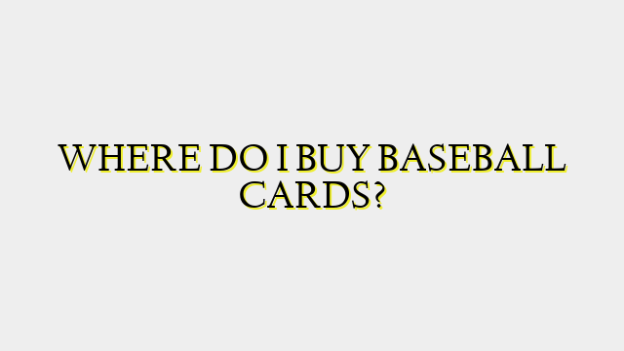WHERE DO I BUY BASEBALL CARDS?
Retail Stores
Many major retail chains sell baseball cards. Card shops located inside stores like Walmart, Target, and Barnes & Noble tend to have a good selection of newer packs, boxes, and accessories at affordable prices. These stores don’t usually have extensive selections of older or higher-end individual cards, but they’re very convenient especially for casual collectors looking to rip packs.
Local Card Shops
Independent hobby shops dedicated solely to trading cards continue to be a staple for collectors. These local shops tend to have knowledgeable staff who can provide advice on building a collection. They usually have the biggest selections overall including older individual cards for sale or trade. Prices may be higher compared to big box retailers, but the service is top-notch. Local card shops are happy to help evaluate collections as well for potential trade-ins.
Online Marketplaces
Websites like eBay and Amazon offer a massive selection of baseball cards from individual collectors and card shops worldwide. This gives buyers access to even rare and vintage cards that may not be available anywhere else. It also requires diligent inspection of listings, sellers, and prices paid. Reputable online card shops like Steel City Collectibles, Daves Cards, and BlowoutCards also sell competitively online with a focus on high-end modern and vintage inventory.
Card Shows
Regularly scheduled card shows are a major weekend event for serious collectors. Vendors from across the regions and sometimes nationally will set up tables displaying thousands of cards for sale or trade. This is an excellent place to explore a huge variety without paying for shipping costs. Shows usuallyhost auctions as well of rare game used memorabilia, autographs and vintage singles priced in the thousands. Admission fees apply but it’s worthwhile to peruse and meet the community. Schedulescan be found through sportscard and collector websites as well as newssites.
Direct From Manufacturers
Companies that produce trading card sets like Topps, Panini, Leaf and Upper Deck sell directly on their websites. This ensures authenticity and avoids paying marketplace fees. They offer new sealed wax boxes, cases, sets and memorabilia cards. Steep discounts occur during online-only promotions and closeouts when new years’ products are arriving. Signing up for manufacturer email lists provides the best deals.
Online Subscriptions
Recent years have seen the rise of monthly membership subscription models from card companies like Loot Locker, Quarter Box and Quarter Box VIP. For a flat fee, members receive curated mystery packages containing a guaranteed number of hits like memorabilia, autographs or rare inserts from the latest releases. While randomized, the value is typically higher than simply purchasing packs or boxes outright.
Peer-to-Peer
Resources like sportscardsforum.com allow collectors to post “for sale/for trade” listings in categorized sections. Individual transactions are arranged through private messaging. Some buyers prefer dealing card-to-card with fellow fans as a fun social experience while also potentially finding unique vintage pieces outside normal retail channels. Meeting online strangers requires transparency on both sides to avoid scams. User feedback systems help verify reputable members.
Auctions
Public auctions through companies like Heritage Auctions, Grey Flannel Auctions and Lelands frequently sell certified vintage baseball memorabilia, autographs and one-of-a-kind game worn pieces reaching thousands or tens of thousands of dollars. While not exactly an everyday buying method for most collectors, browsing active and past auctions is fascinating for appreciating record-setting rare card values and pieces of history changing hands. Auctioneers strive to clearly showcase condition details.
The choice for purchasing baseball cards depends greatly on an individual’s specific needs – whether looking for new wax to rip, vintage singles, trades, deals in bulk or truly valuable conditioned pieces. Collector experience also plays a role in feeling comfortable with different sale channels. While retail stores and online marketplaces offer immense selection, local shops and shows provide a social experience die-hard hobbyists enjoy as just as much as building their collections.




